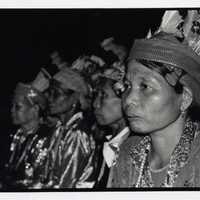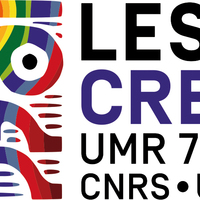Deprecated: strpos(): Passing null to parameter #1 ($haystack) of type string is deprecated in /var/www/html/themes/BBCFoundation/view/omeka/site/item/show.phtml on line 31
Deprecated: strpos(): Passing null to parameter #1 ($haystack) of type string is deprecated in /var/www/html/themes/BBCFoundation/view/omeka/site/item/show.phtml on line 45
Taba' Pasen (last day of Gawai Mamandung)
Field recordings made in West Kalimantan, Indonesia, in 1997 by D. Rappoport :Dayak, Iban, Kayan populations.
- Archivist's Original Title
- Original description
- Time duration
- Recording date of the original material
- Acquisition Date
- Population
- Place of the cultural origin
- Country Name
- Recording place
- Resource Language
- Comment
- Archivist Category
- Recording context
- Collector
- Name of original Collection
- Collection source citation
- Related material
- External reference
- History of ownership
- Holding Institution of Original Materials
- Licensing Institution
- Accessing Institutions
- Copyright Information
- Copyright Notice
- Physical format
- Preservation State of Physical Object
- Original item number
- SEAH Identifier
-
en
Taba' Pasen (last day of Gawai Mamandung)
-
fr
Taba' Pasen (dernier jour du Gawai Mamandung)
-
id
Taba' Pasen (hari terakhir Gawai Mamandung)
-
en
Field recordings made in West Kalimantan, Indonesia, in 1997 by D. Rappoport :Dayak, Iban, Kayan populations.
-
fr
Enregistrements sonores inédits réalisés en Indonésie (West Kalimantan) en 1997 par Dana Rappoport, auprès des populations Dayak Taman, Iban, Kayan Mendalam.
-
id
Rekaman dibuat di Indonesia (Kalimantan Barat) pada tahun 1997 oleh Dana Rappoport, dalam masyarakat Mendalam Dayak Taman, Iban, Kayan.
-
en
00:01:55
-
en
1997-08-12
-
en
2011
-
en
Dayak Taman
-
en
Kampung Lunsa Hilir, kecamatan Putussibau, kabupaten Kapuas ulu, West Kalimantan
-
en
Taman
-
en
Last day of the Gawai, the day which is called maamasi or aso pasiap. On the sixth day, other decorated boats arrive. This time, it is the women of the surrounding villages. They bring eight kinds of cakes. After going around the cow cages, they too must cut down a log to gain access to the longhouse. After the sacrifices, the pasiap ritual takes place, which consists of a long procession of a hundred women all around the long gallery in which the men are seated. Before entering the long gallery, the women gracefully dance. Splendid, dressed in pearls embroidered with gold and coins, a headband of pearls around their heads, they each carry an iron kettle filled with cakes. They circulate in file to put in the mouth of each man cakes of eight kinds. The gesture, of a highly erotic nature, is often dismissed today. Rhythm of nostalgia.
-
fr
Dernier jour du gawai, le jour qui se nomme maamasi ou aso pasiap. Au sixième jour, d'autres bateaux décorés arrivent. Cette fois, ce sont les femmes des villages environnants. Elles apportent huit sortes de gâteaux. Après avoir fait le tour des cages à vache, elles doivent elles aussi abattre une bûche pour accéder à la longue maison. Après les sacrifices a lieu le rituel pasiap qui consiste en un long défilé d'une centaine de femmes tout autour de la longue galerie dans laquelle sont assis les hommes. Avant d'entrer dans la longue galerie, les femmes dansent gracieusement. Splendides, en habit de perles brodés d'or et de pièces, un bandeau de perles autour de la tête, elles portent chacune une bouilloire en fer remplie de gâteaux. Elles circulent en file pour mettre dans la bouche de chaque homme des gâteaux de huit sortes. Le geste, de nature fortement érotique, est aujourd'hui souvent évincé. Rythmique de nostalgie.
-
id
Hari terakhir Gawai, hari yang disebut maamasi atau aso pasiap. Pada hari keenam, perahu hias lainnya tiba. Kali ini, yang datang adalah para wanita dari desa-desa sekitar. Mereka membawa delapan jenis kue. Setelah mengelilingi kandang sapi, mereka juga harus menebang sebatang kayu untuk menuju rumah panjang. Setelah pengorbanan, ritual pasiap berlangsung, yang terdiri dari prosesi panjang seratus wanita mengelilingi galeri panjang tempat para pria duduk. Sebelum memasuki galeri panjang, para wanita menari dengan anggun. Cantik, mengenakan mutiara yang disulam dengan emas dan koin, ikat kepala mutiara di kepala mereka, mereka masing-masing membawa ketel besi yang berisi kue. Mereka beredar dalam barisan untuk memasukkan kue-kue yang terdiri dari delapan jenis ke dalam mulut masing-masing pria. Gerakan yang sangat erotis ini sering kali diabaikan saat ini. Irama nostalgia.
-
en
Music (Vocal and instrumental)
-
en
Field recording
-
en
Indonesia: West Kalimantan, 1997, D. Rappoport
-
en
RappoportPercussions des Taman, in revue Percussions, n° 59, vol IX/5, 1998.
-
en
Archived at CREM, CNRS in 2011 by D. Rappoport
-
In Copyright. Non-Commercial Use Permitted
-
For any use, please contact the CREM-LESC (CNRS, Nanterre University, France): crem.lesc[at]cnrs.fr ; See information at https://archives.crem-cnrs.fr
-
en
Digital Audio Tape
-
en
original
-
en
CNRSMH_I_2011_016_004_01
-
en
SEAH_CNRSMH_I_2011_016_004_01
- Media






